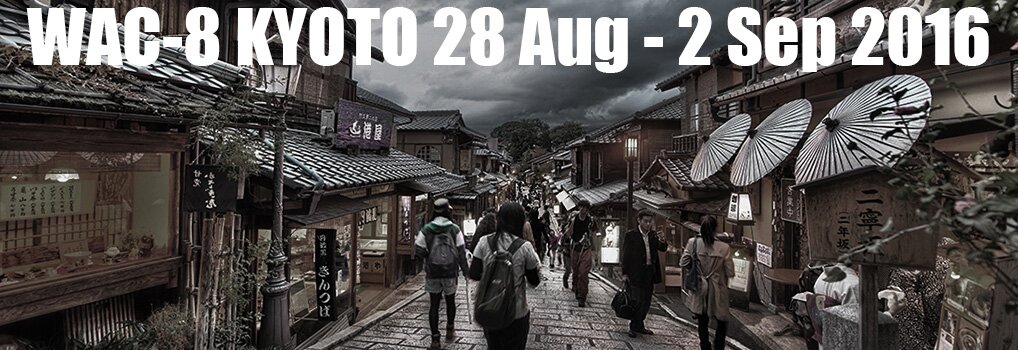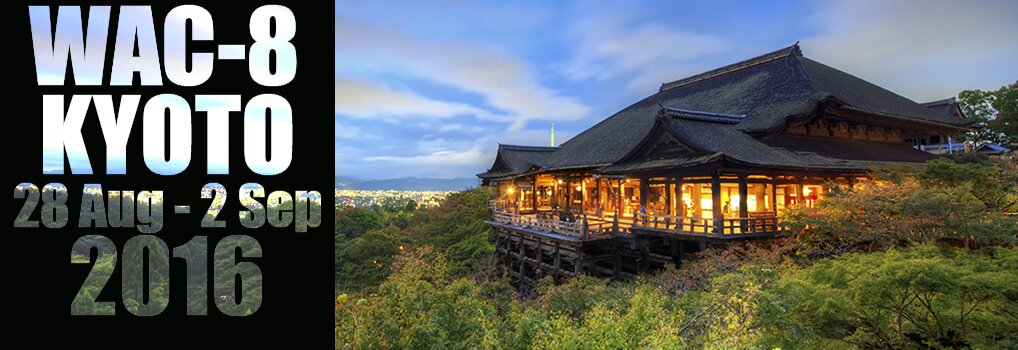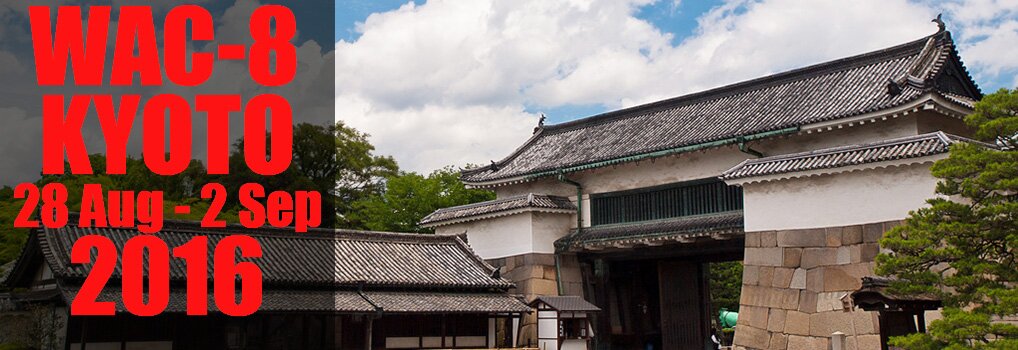| T01 | T02 | T03 | T04 | T05 | T06 | T07 | T08 | T09 | T10 | T11 | T12 | T13 | T14 | T15 |
| Theme list | Session organizers index | Accepted sessions list |
| T04. Archaeological Ethics: Where Are We Now? Anne Pyburn, Joanne Farchakh Bajjaly’s and Marcia Bezerra |
|---|
| The World Archaeological Congress was born when Peter Ucko encouraged an international group of archaeologists to accept their responsibility to social justice and take a principled stand against South African apartheid and all kinds of political oppression. Following this watershed event, Archaeology has undergone a revolution in professional practice resulting from and further instigating changes in both method and theory. Many of the important changes in the discipline are related to a new sense of ethical responsibility to archaeology’s many publics, and the recognition that among these constituencies are important heritage experts besides academic and scholarly specialists. Archaeologists themselves have been led into active engagement with topics that archaeologists of the last generation mostly strove to avoid, and now routinely engage in economic development, community based research, Indigenous rights movements, critiques and protests addressing heritage and nationalism, and the politics of preservation, tourism, and UNESCO. Many previous congress sessions have addressed the rise of such efforts but now it is time for a discussion and reconsideration of the successes and failures stemming from the WAC revolution. Sessions comprising the WAC-8 Theme “Archaeological Ethics: Where Are We Now?” will take the next step and begin to review, analyze, and evaluate the successes and failures of archaeologists’ efforts to reach new levels of social responsibility and political engagement over the 30 years since Peter Ucko turned archaeology’s responsibility for the past to the future. |
Inclusive data management and sharing in archaeology
Organiser(s): Yasuhisa Kondo (Research Institute for Humanity and Nature / Japan) and Eric Kansa (UC Berkeley / USA)
Type: Symposium
Contact: kondo(at)chikyu.ac.jp
Abstract:
Digital archiving and dissemination of data facilitates continual re-study of data, the asking and answering of new questions to old data, the testing of novel hypotheses, the collaboration across regions and researchers, and the synthesis of results through exploration of multiple data sets. However, realizing the potential of digital data involves a host of incentive challenges, skills gaps, financial challenges, cultural shifts, and poorly-explored methodological and theoretical challenges. While our community recognizes the potential value of digital data, we must put effort and thought into realizing this potential—through rewards/incentives, training, and a cultural shift in expectations around digital contributions. Similarly, because archaeological data often describe elements of contested pasts, the “datafication” of archaeology presents new ethical challenges. How do we reconcile opportunities for data sharing to make interpretation more public and inclusive while recognizing that archaeological data can also be misused and appropriated? What kinds of archaeological practice need to be developed to make data management more inclusive and not a new form of colonialism? This session welcomes papers related to (but not limited to) any of these questions.
Keywords: digital archiving, data management and sharing, open science
Cancelled
Shortcomings in the Ethical Practice of Archaeology: What are we going to do about it?
Organiser(s): K. Anne Pyburn (Indiana University / USA), Joanne Farchakh Bajjaly (Archeologia / Lebanon) and Marcia Bezerra (Universidade Federal do Pará / Brazil)
Type: Workshop
Contact: apyburn(at)indiana.edu
Abstract:
The World Archaeological Congress was born when Peter Ucko encouraged an international group of archaeologists to accept their responsibility to social justice and take a principled stand against South African apartheid and all kinds of political oppression. Following this watershed event, Archaeology has undergone a revolution in professional practice . Many important changes in the discipline are related to a new sense of ethical responsibility to archaeology’s many publics, and recognition of important heritage experts besides academic and scholarly specialists. Archaeologists have been led into active engagement with topics that the last generation mostly strove to avoid, and now routinely engage in economic development, community based research, Indigenous rights movements, critiques and protests addressing heritage and nationalism, and the politics of preservation, tourism, and UNESCO. Many previous congress sessions have addressed the rise of such efforts but now it is time for a discussion and reconsideration of the successes and failures stemming from the WAC revolution. We identify this as a workshop rather than a forum as we intend to develop a proposal for actions to be taken to improve ethical practice.
Keywords: WAC history, ethics, social archaeology
Cancelled
Archaeology, Interethnic Relations and Peace Building
Organiser(s): Aida Abdykanova (American University of Central Asia / Kyrgyz Republic), Anne Pyburn (Indiana University / USA) and Marcia Bezerra (Universidade Federal do Pará / Brazil)
Type: Workshop
Contact: abdykanova(at)gmail.com
Abstract:
Recently interethnic relations in multiethnic states have attracted greater importance. More people identify themselves with a particular ethnicity and ethnic group and more conflicts take an ethnic form. Therefore, nowadays it becomes extremely important to prevent interethnic conflicts, to establish peace and harmony in multiethnic societies, and to teach people to be tolerant towards one another. This session aims to bring together scholars and experts to share and exchange the ongoing research projects on ethnic studies and discuss the to potential of ethnic studies in the scholarly community to impact the public.
Keywords: WAC history, ethics, social archaeology
Open Archaeology: The Ethics of Sharing Heritage
Organiser(s): Doug Rocks-Macqueen (Landward Research Ltd. / UK) and Joshua Wells (Indiana University South Bend / USA)
Type: Symposium
Contact: doug(at)landward.org
Abstract:
Abstract- Open Access, Open Source, Open Data, etc. The movement to make one’s work open and reusable by others has grown tremendously in the heritage sector over the last few decades. There are now over a hundred archaeology journals around the world that make some of their content Open Access. Archaeologists now blog or tweet about their research in real time or close to it. We even have archaeology specific software that are open source and reusable by anyone. But, what are the ethics of making our work open? Should all archaeological research be made freely available, immediately and without reservations? What happens if I am open up my research and then someone steals my work? Is making working our work open right or wrong or is the answer more nuanced? Is there an answer?
We invite papers on the topic of the ethics of making archaeology open and accessible. It is open to all topics surrounding openness. From theoretical discussions to cases studies to personal experiences, good or bad, all types of presentations are desired and all perspectives are welcomed.
Keywords: Open Archaeology: The Ethics of Sharing Heritage
Archaeology and Human Rights
Organiser(s): Quetzil Casteneda (Indiana University / USA) and Anne Pyburn (Indiana University / USA)
Type: Symposium
Contact: contact(at)osea-cite.org
Abstract:
Archaeologists disagree about whether archaeologists should involve themselves in disputes about indigeneity, authenticity and priority that have political ramifications in the present. On one side are those who see these topics as feeding essentialism and political divisions; others argue that establishing empirical connections to the past is a crucial element in the crusade for human rights for Indigenous people. Political boundaries, economic access, and development strategies are all affected by what archaeologists say about continuity with the past, whether or not archaeologists choose to consider themselves directly involved. In this session, the archaeologist’s role in identity politics and human rights will be considered and debated.
Keywords: Land rights, human rights, activism
Digital Bioarchaeology: New Dimensions, New Methods, New Ethics
Organiser(s): Brenna Hassett (Natural History Museum / UK), Carolyn Rando (University College London / UK) and Emmy Bocaege (Université de Bordeaux / France)
Type: Symposium
Contact: brennawalks(at)gmail.com
Abstract:
The rapid proliferation of new image-capture and computational methods in bioarchaeology has
opened new opportunities for research and collaboration. Techniques including computed tomography (CT), laser scanning, and photogrammetry are now being introduced, but without a holistic approach towards research applications, long term data preservation and the ethical implications of this brave new world of Big Digital Data and Open Access. This session will bring together researchers addressing both the ‘why’ and the ‘how’ of the new digital frontier of bioarchaeology. Papers are invited from individuals working with digital data in bioarchaeology that address the following critical issues: What are the analytical uses of the digital data these new methodologies allow us to capture? What are the ethical and professional issues that arise from storing, sharing, and publicizing digital models of human remains? And finally, what are the potential alternative uses for this new avalanche of data – are there applications for education, outreach, and public engagement?
Keywords: bioarchaeology, 3d modelling, digital archaeology
Cancelled
Gender in Contemporary Archaeological Practice: Identifying Biases and Proposing Solutions
Organiser(s): Peter Stone (Newcastle University / UK) and Anne Pyburn ( Indiana University / USA)
Type: Symposium
Contact: peter.stone(at)newcastle.ac.uk
Abstract:
The role of women in ancient societies has been reconsidered at least in part as a result of an increase in the number of women in professional positions in the field. More recently, stereotypes of masculinity have been targeted for narrowing our view of the past. Queer studies have moved the field beyond the “add gender and stir” approach that characterized the early days of the millennium.
But has archaeology really changed? Men still outnumber women in both academic and professional settings. Shocking data on sexual harassment in field and laboratory settings have recently been reported. Women are not well represented on the lists of major research grants. Scholars envisioning past societies still routinely organize their data through unexamined assumptions about male centered political systems and heteronormative nuclear families. Critiques of these perspectives are routinely dismissed by reviewers as “failing to face the reality” of male dominance across time and space. Generally speaking, heterosexual men continue to be underrepresented in research on gender.
Keywords: WAC history, ethics, social archaeology, gender
Cancelled
Open Ethics – Issues emerging at WAC 8
Organiser(s): Alexander Herrera (Universidad de los Andes / Colombia) and Zacharys Gundu (Ahmadu Bello University / Nigeria)
Type: Forum
Contact: alherrer(at)uniandes.edu.co
Abstract:
This forum is intended as the place to openly and collectively address thorny issues of global significance for archaeology, such as typically arise from discussions in other sessions (e.g. on intellectual property, human remains and repatriation, war) or come to the fore unexpectedly during the congress´ duration (e.g. critical threats from infrastructure works, ongoing protests, looting sprees). No formal papers are envisaged. Chairs of all WAC 8 session are encouraged to refer “impossible” discussions on archaeological ethics to this forum. WAC members, including WAC´s Committee on Ethics, will be on hand to facilitate discussion and point to possible courses of action consistent with WAC´S core values: to support social justice and ethical relationships and practices in archaeology.
Keywords: Archaeological ethics, injustice, inequality
Cosmopolitanism, Postcolonialism and Identity: implications for ethics in archaeology
Organiser(s): Cherrie De Leiuen (Flinders University/ Australia) and Eleanor King (Howard University/ USA)
Type: Forum
Contact: cherrie.deleiuen(at)flinders.edu.au
Abstract:
This session focuses on major influences towards diverse understandings of ethics in archaeology. Cosmopolitanism has enriched understandings of the ethical values held by different peoples at a global level. Postcolonialism has enriched understandings of the ethical values of Indigenous peoples and of people in countries once colonized by European powers. In addition, conversations around gendered and racial identities are depicting these identities as increasingly fluid, constructed, even obscuring. This movement to incorporate diverse ethical values into archaeological practice has been supported by feminist theories and gender archaeologies that aim to incorporate multi-vocal perspectives from different social groups, countries and academic traditions.
These are not homogeneous processes. Anglo- American practitioners, for example, have produced most literature on postcolonialism, gender archaeology and, to a lesser extent, cosmopolitanism. How are these forms of diversity informing archaeology in other parts of the world? What are the material manifestations of these processes? How do our ethical values differ? Are there any common values that cut across all cultures? What are the implications for archaeological practice? This is our subject of inquiry.
Keywords: Diversity, Ethics, Cosmopolitanism, Postcolonialism, Identity
Archaeological ethics: walking the talk
Organiser(s): Alexander Herrera (Universidad de los Andes / Colombia) and Makoto Tomii (Kyoto University / Japan)
Type: Symposium
Contact: alherrer(at)uniandes.edu.co
Abstract:
After decades of talking about ethical issues in archaeology, this session asks if codes, charters and committees have really changed archaeological practice. If so, how? If not, what now?
Professional organizations and pressure groups across the globe have variously aimed to set guidelines, minimum ethical standards for practices to raise the level of archaeological practice across a country or region or high bars that individual archaeologists should strive for as part of broader efforts to change the world. The World Bank and other multi-lateral banks have also recently reviewed Cultural Heritage policy as part of their global repositioning. Many governments have also shown increasing interest in the privatization of heritage sites for the tourism industry.
Critical and forward looking papers are invited that reflect upon the history of archaeological ethics, present inspiring case studies, or highlight how inter-scalar feedbacks redress or intensify inequalities, are especially welcome.
Contributions for this session have been offered by Alejandro Haber, Anne Pyburn, Makoto Tomii and Alexander Herrera. We will endeavour to include presentations by non-members of the WAC Committee on Ethics.
Keywords: Archaeological ethics, injustice, inequality




